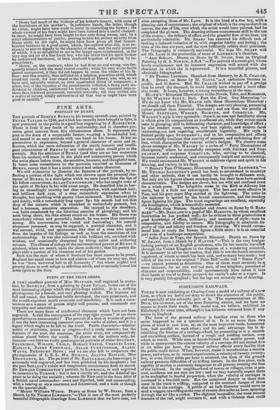FINE ARTS. PORTRAIT OF BURNS.
THE portrait of ROBERT BURNS in his twenty-seventh year, painted by PETER TAYLOR in 1786, and which has recently been brought to light, is now presented to the public in a good line engraving by J. HonsBuRou. There is little if any doubt of its authenticity, and it therefore pos- sesses great interest from this circumstance alone. It represents the poet in the dress of a respectable farmer, wearing a broad-leafed hat, and seated in an easy attitude with one hand in his bosom. It has no pretensions to expression, beyond a general character of sense and re. flection, which the mere delineation of the manly features and intelli- gent countenance of BURNS by any tolerable artist would give to the portrait. But the admirers of BURNS (and they are no less numerous than his readers) will trace in the plain and unassuming person which the artist places before them, the sensitive, humane, and thoughtful man. It bears some resemblance to the portraits received as likenesses of BURNS, except that it has a more mature and sedate character. We will endeavour to illumine the features of the portrait, by re- flecting a portion of the light which was thrown upon the personal cha- racter of BURNS, in a description which we once heard from the lips of his fellow countryman, ALLAN CUNNINGHAM ; who has caught some of the spirit of BURNS in his wild sweet songs. He described him as hav- ing an exceedingly swarthy but clear complexion, with coal-black hair, and brilliant dark eyes, of a deep melancholy expression when in thought, but sparkling with gayety when animated. His features plain and manly, with a remarkably long upper lip : his mouth had not that drop of the corners which is remarked in melancholy persons, but had a humane, sensitive expression. He stooped in the shoulders, —a habit occasioned by the laborious exercise of ploughing; and his neck being short, his chin almost rested on his breast. His frame was remarkably robust and powerful ; indeed, he was more than commonly Strong. His conversation was varied and fascinating ; his natural eloquence possessed, as may be supposed, a poetical character, and it was earnest, vivid, and spontaneous, like that of a man who speaks from the impulse of his feelings as well as from the conviction of his understanding. It was also enlivened with brilliant wit, enriched with wisdom, and occasionally sharpened by biting satire and withering sarcasm. The climax of eulogy of the conversational powers of BURNS is attained, when we assert, upon the above authority, that his poetry dis- plays only a portion of his resources and of his genius.
Such was the man of whom if Scotland has most reason to be proud, England has equal cause to love and admire—of whom we may say, that he was "born universal heir to all humanity ;" but whom neglect and poverty drove to seek refuge in oblivious mirth, and eventually bowed his noble spirit to the dust.


























 Previous page
Previous page